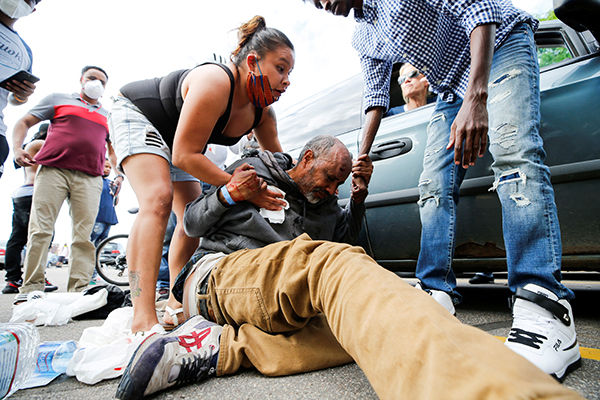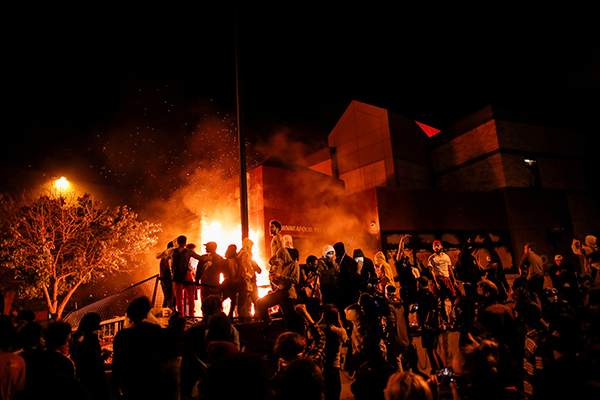
St. PAUL, MINN. — The shocking video that has reverberated around the world showing a Minneapolis police officer kneeling on the neck of a handcuffed man repeatedly saying “I can’t breathe,” and who later died is “gut-wrenching and deeply disturbing,” Archbishop Bernard A. Hebda of St. Paul and Minneapolis said in a statement, Catholic News Service reported.
“The sadness and pain are intense,” Archbishop Hebda said of the circumstances surrounding the May 25 death of George Floyd. “Let us pray for comfort for his grieving family and friends, peace for a hurting community, and prudence while the process moves forward. We need a full investigation that results in rightful accountability and veritable justice.”
A bystander filmed at least part of the police confrontation with the Floyd, a 46-year-old African American restaurant worker who was reportedly arrested on suspicion of forgery.
Floyd was pronounced dead at Hennepin County Medical Center a short time after the street encounter with cops. The four cops involved Floyd’s arrest have been fired. In response to demands for justice, the FBI has opened up a federal civil rights investigation into the case.
The cop, whose name is Derek Chauvin, and is seen on the video pinning Floyd down by kneeling on his neck is white. He was arrested on May 29, Minneapolis station WBNS reported.
Brooklyn Bishop Nicholas DiMarzio issued a statement condemning racism in America and calling on Christians to fight against it.
“In Minneapolis, a black man suspected of a crime was handcuffed and brutalized by a policeman, which caused his death. The same week here in New York, a woman called police on a man falsely claiming he was threatening her with harm – his only crime was being a person of color.,” Bishop DiMarzio said.
“These instances have led to protests and violence since persons of color feel they have no recourse. We Christians must be fierce in our opposition to the evil of racism, but we must respond peacefully and remember the Lord’s call to us to love one another as He loves us,” the bishop added.
The death of George Floyd led to protests against police brutality in Minneapolis and in cities across the country on subsequent nights, including New York City, where at least 70 people were arrested during clashes with cops on May 28.

But the largest protests took place in Minneapolis. On May 28, protesters entered the 3rd Police Precinct — where it was believed the officers involved in the Floyd incident worked — and burned down the building. The breach occurred at about 10 p.m., with rioters setting fires inside the building and outside near the main entrance.
The precinct had already been evacuated by the time the fire started, officials said.
Police released a statement saying in part, “in the interest of the safety of our personnel, the Minneapolis Police Department evacuated the 3rd Precinct of its staff. Protesters forcibly entered the building and have ignited several fires.”
Minneapolis Mayor Jacob Frey called on May 27 for criminal charges to be brought against the officer who pinned Floyd down with his knee.
But after violent protests and looting of stores continued in his city, Frey called for calm. “We cannot let tragedy beget more tragedy,” he said.
In his statement, Archbishop Hebda called for respect for all people and asked for prayers for Floyd and his family:
“Particularly at this time when human fragility has been brought into focus by the COVID-19 pandemic, we are called to respect the worth and dignity of each individual, whether they be civilians in need of protection or law enforcement officers charged with providing that protection. All human life is sacred. Please join our Catholic community in praying for George Floyd and his family, and working for that day when ‘love and truth will meet (and) justice and peace will kiss’ (Psalm 85).”
Archbishop Hebda also posted on Twitter that he offered Mass that morning for Floyd and his family.
“In these days before Pentecost, we pray that the Holy Spirit, the Breath of God, might help ease our collective pain, promote justice, and bring about greater respect for all human life,” Archbishop Hebda said.
Other Catholic leaders are also expressing shock and disgust with the Floyd case, Catholic News Service reported.

In a video message posted two days after Floyd’s death, Father Erich Rutten, the pastor of St. Peter Claver, St. Paul’s historically black Catholic parish, called on his parishioners “to agitate” their community, the Church and world for racial justice and healing.
The now infamous video showing a white police officer kneeling on Floyd’s neck while Floyd, who is handcuffed, repeatedly said he couldn’t breathe, “seems so egregious,” Father Rutten said. “I am saddened. I am sickened. I am angered. And I am tired of such things happening again and again. How long, O Lord, must we endure such things?”
In other reaction, the General Council of the Dominican Sisters of Adrian, Michigan, said Floyd’s “anguished cry, ‘I can’t breathe,’ as an officer pressed his knee into his neck, harkened back to the cries six years ago of Eric Garner, another unarmed African American man who died in New York police custody.”
Garner died on a Staten Island street during an encounter with police.
Article was updated to include statement from Bishop Nicholas DiMarzio.
